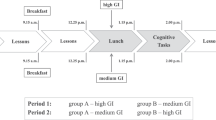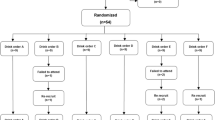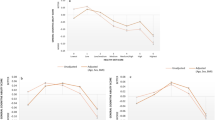Abstract
Objectives:
The aim of this study was to assess how the glycaemic potency (blood glucose (BG)-raising potential) of breakfast is associated with cognitive function (CF) in school children, taking into account important confounders, including iron status, underlying physiological adaptations and socio-economic status.
Methods:
Sixty children aged 11–14 years were selected on the basis of having breakfast habitually. Their breakfast and any snacks eaten on the morning of the study were recorded. They were categorized into four groups according to the glycaemic index (GI) and glycaemic load (GL) of the breakfast: low-GI, high-GL; high-GI, high-GL; low-GI, low-GL and high-GI, low-GL above or below the median for GI=61 and GL=27. BG levels were measured in finger-prick blood samples immediately before and immediately after the CF tests.
Results:
A low-GI, high-GL breakfast was associated with better performance on a speed of information processing (P<0.01) and a serial sevens (P<0.001) task 90 min later; a high-GI breakfast with better performance on an immediate word recall task (P<0.01); and a high-GL breakfast with better performance on a Matrices task (P<0.01).
Conclusions:
GI, GL or both were associated with performance on the majority of the CF tests (4 of 7) used. This study describes the macronutrient composition of breakfast that could have a positive influence on the cognition of school children, proposes the use of both GI and GL to estimate exposure, and discusses future directions in this area of research.
This is a preview of subscription content, access via your institution
Access options
Subscribe to this journal
Receive 12 print issues and online access
$259.00 per year
only $21.58 per issue
Buy this article
- Purchase on Springer Link
- Instant access to full article PDF
Prices may be subject to local taxes which are calculated during checkout
Similar content being viewed by others
References
ADA (1996). Consensus statement on clinical practice recommendation: self-monitoring of blood glucose. Diabetes Care 19, S62–S66.
ADA (2004). Dietary carbohydrate (amount and type) in the prevention and management of diabetes. A statement by the American Diabetes Association. Diabetes Care 27, 2266–2271.
Barclay A, Brand-Miller J, Wolever TM (2005). Glycemic index, glycemic load, and glycemic response are not the same. Diabetes Care 28, 1839.
Benton D, Maconie A, Williams C (2007). The influence of the glycaemic load of breakfast on the behaviour of children in school. Physiol Behav 92, 717–724.
Benton D, Owens D, Perales CG (1994). Blood glucose influences memory and attention in young adults. Neuropsychobiology 32, 595–607.
Benton D, Parker PY (1998). Breakfast, blood glucose, and cognition. Am J Clin Nutr 67, S772–S778.
Benton D, Ruffin MP, Lassel T, Nabb S, Messaoudi M, Vinoy S et al. (2003). The delivery rate of dietary carbohydrates affects cognitive performance in both rats and humans. Psychopharmacology (Berl) 166, 86–90.
Bradley RH, Corwyn RF (2002). Socioeconomic status and child development. Annu Rev Psychol 53, 371–399.
Brand-Miller JC, Thomas M, Swan V, Ahmad ZI, Petocz P, Colagiuri S (2003). Physiological validation of the concept of glycemic load in lean young adults. J Nutr 133, 2728–2732.
Chandler AM, Walker SP, Connolly K, Grantham-McGregor SM (1995). School breakfast improves verbal fluency in undernourished Jamaican children. J Nutr 125, 894–900.
Conners CK, Blouin AG (1982). Nutritional effects on behavior of children. J Psychiatr Res 17, 193–201.
Craft S, Murphy C, Wemstrom J (1994). Glucose effects on complex memory and nonmemory tasks: the influence of age, sex, and glucoregulatory response. Phychobiology 22, 95–105.
DH (2005). Department of Health; Devise Evaluation Services; Blood Glucose Monitoring: Know Your Systems. http://www.mhra.gov.uk
Dolan RJ (2002). Emotion, cognition, and behavior. Science 298, 1191–1194.
Donohoe RT, Benton D (1999). Cognitive functioning is susceptible to the level of blood glucose. Psychopharmacology (Berl) 145, 378–385.
Dye L, Lluch A, Blundell JE (2000). Macronutrients and mental performance. Nutrition 16, 1021–1034.
Elliot C, Smith P, McCulloch K (1996). British Ability Scales (BAS II), 2nd ed. Windsor, Berkshire.
FAO/WHO (1998). FAO Food and Nutrition Paper No 66. Carbohydrates in Human Nutrition. Report of a Joint FAO/WHO Expert Consultation. FAO Rome.
Foster-Powell K, Holt S, Brand-Miller J (2002). International table of glycemic index and glycemic load values. Am J Clin Nutr 76, 5–56.
Gibson EL, Green MW (2002). Nutritional influences on cognitive function: mechanisms of susceptibility. Nutr Res Rev 15, 169–206.
Gibson EL (2007). Carbohydrates and mental function: feeding or impeding the brain? Nutr Bull 32, 71–83.
Gordon N (2003). Iron deficiency and the intellect. Brain Dev 25, 3–8.
Government Statistical Service (1990). Standard Occupational Classification; Volumes 1, 2 & 3, Office for National Statistics. The Stationery Office: London.
Halterman JS, Kaczorowski JM, Aligne CA, Auinger P, Szilagyi PG (2001). Iron deficiency and cognitive achievement among school-aged children and adolescents in the United States. Pediatrics 107, 1381–1386.
Hayman M (1942). Two minute clinical tests for measurement of intellectual impairment in psychiatric disorders. Arch Neurol Psychiatry 47, 454–464.
Heatherley SV, Hayward RC, Seers HE, Rogers PJ (2005). Cognitive and psychomotor performance, mood, and pressor effects of caffeine after 4, 6 and 8 h caffeine abstinence. Psychopharmacology (Berl) 178, 461–470.
Hoyland A, Lawton CL, Dye L (2008). Acute effects of macronutrient manipulations on cognitive test performance in healthy young adults: a systematic research review. Neurosci Biobehav Rev 32, 72–85.
Ingwersen J, Defeyter MA, Kennedy DO, Wesnes KA, Scholey AB (2007). A low glycaemic index breakfast cereal preferentially prevents children's cognitive performance from declining throughout the morning. Appetite 49, 240–244.
Jenkins DJ, Wolever TM, Taylor R, Barker H, Fielden H, Baldwin J et al. (1981). Glycemic Index of foods: a physiological basis for carbohydrate exchange. Am J Clin Nutr 34, 362–366.
Kennedy DO, Scholey AB (2000). Glucose administration, heart rate and cognitive performance: effects of increasing mental effort. Psychopharmacology (Berl) 149, 63–71.
Lloyd HM, Rogers PJ, Hedderley DI, Walker AF (1996). Acute effects on mood and cognitive performance of breakfasts differing in fat and carbohydrate content. Appetite 27, 151–164.
Lorr M, McNair D (1984). Profile of Mood States Bi-polar Form. Educational & Industrial Testing Service: San Diego, CA.
Ludwig DS (2002). The glycemic index: physiological mechanisms relating to obesity, diabetes, and cardiovascular disease. JAMA 287, 2414–2423.
Mahoney CR, Taylor HA, Kanarek RB, Samuel P (2005). Effect of breakfast composition on cognitive processes in elementary school children. Physiol Behav 85, 635–645.
Manly T, Anderson V, Nimmo-Smith I, Turner A, Watson P, Robertson IH (2001). The differential assessment of children's attention: the Test of Everyday Attention for Children (TEA-Ch), normative sample and ADHD performance. J Child Psychol Psychiatry 42, 1065–1081.
Messier C (2004). Glucose improvement of memory: a review. Eur J Pharmacol 490, 33–57.
Nabb S, Benton D (2006). The influence on cognition of the interaction between the macro-nutrient content of breakfast and glucose tolerance. Physiol Behav 87, 16–23.
NDNS (2000). Food Standards Agency. National Diet and Nutrition Survey: Young People Aged 4 to 18 Years. The Stationery Office: London.
Nelson M, Atkins M, Meyer J (1997). Food Portion Sizes, a User's Guide to Photographic Atlas. MAFF Publications: London.
Owens DS, Parker PY, Benton D (1997). Blood glucose and subjective energy following cognitive demand. Physiol Behav 62, 471–478.
Pollitt E, Leibel RL, Greenfield D (1981). Brief fasting, stress, and cognition in children. Am J Clin Nutr 34, 1526–1533.
Pollitt E, Lewis NL, Garza C, Shulman RJ (1982). Fasting and cognitive function. J Psychiatr Res 17, 169–174.
Riby LM (2004). The impact of age and task domain on cognitive performance: a meta-analytic review of the glucose facilitation effect. Brain Impair 5, 145–165.
Rogers PJ, Richardson NJ, Elliman NA (1995). Overnight caffeine abstinence and negative reinforcement of preference for caffeine-containing drinks. Psychopharmacology (Berl) 120, 457–462.
Salmeron J, Manson J, Stampfer M, Colditz G, Wing A, Willet W (1997). Dietary fiber, glycemic load, and risk of non-insulin-dependent diabetes mellitus in women. JAMA 277, 472–477.
Scholey AB, Harper S, Kennedy DO (2001). Cognitive demand and blood glucose. Physiol Behav 73, 585–592.
Scholey AB, Kennedy DO (2004). Cognitive and physiological effects of an ‘energy drink’: an evaluation of the whole drink and of glucose, caffeine and herbal flavouring fractions 112. Psychopharmacology 176, 320–330.
Simeon DT, Grantham-McGregor S (1989). Effects of missing breakfast on the cognitive functions of school children of differing nutritional status. Am J Clin Nutr 49, 646–653.
Smith AP, Clark R, Gallagher J (1999). Breakfast cereal and caffeinated coffee: effects on working memory, attention, mood, and cardiovascular function. Physiol Behav 67, 9–17.
Stroop JR (1935). The basis of Ligon's theory. Am J Psychol 47, 499–504.
Sunram-Lea SI, Foster JK, Durlach P, Perez C (2001). Glucose facilitation of cognitive performance in healthy young adults: examination of the influence of fast-duration, time of day and pre-consumption plasma glucose levels. Psychopharmacology (Berl) 157, 46–54.
Taylor LA, Rachman SJ (1988). The effects of blood sugar level changes on cognitive function, affective state, and somatic symptoms. J Behav Med 11, 279–291.
Vaisman N, Voet H, Akivis A, Vakil E (1996). Effect of breakfast timing on the cognitive functions of elementary school students. Arch Pediatr Adolesc Med 150, 1089–1092.
Wesnes KA, Pincock C, Richardson D, Helm G, Hails S (2003). Breakfast reduces declines in attention and memory over the morning in schoolchildren. Appetite 41, 329–331.
Wolever TM, Jenkins DJ (1986). The use of the glycemic index in predicting the blood glucose response to mixed meals. Am J Clin Nutr 43, 167–172.
Acknowledgements
All authors revised the manuscript for important intellectual content, and approved final manuscript for submission. We are grateful to Ms Julia Forbes and Ms Kathryn Lowes, who helped in carrying out fieldwork and data coding, and to all the enthusiastic volunteers who participated in this trial. Financial support was obtained from the Harokopeio University PhD scholarship.
Author information
Authors and Affiliations
Corresponding author
Ethics declarations
Competing interests
The authors declare no conflict of interest.
Additional information
Contributors: RM performed statistical analysis, data interpretation, selected cognitive function tests and prepared the manuscript. PR selected and developed the cognitive function tests, mood scales and task demand questionnaire. MN supervised the project, statistical analysis, data interpretation and manuscript preparation. All authors revised the manuscript for important intellectual content, and approved final manuscript for submission.
Supplementary Information accompanies the paper on European Journal of Clinical Nutrition website
Supplementary information
Appendix A
Appendix A
List of 22 mood states assessed
-
1
Friendly
-
2
Nervous
-
3
Drowsy
-
4
Happy
-
5
Calm
-
6
Uncertain
-
7
Sad
-
8
Energetic
-
9
Muddled
-
10
Relaxed
-
11
Dissatisfied
-
12
Alert
-
13
Confident
-
14
Tired
-
15
Angry
-
16
Contented
-
17
Lively
-
18
Tense
-
19
Sluggish
-
20
Clearheaded
-
21
Hungry
-
22
Thirsty
Rights and permissions
About this article
Cite this article
Micha, R., Rogers, P. & Nelson, M. The glycaemic potency of breakfast and cognitive function in school children. Eur J Clin Nutr 64, 948–957 (2010). https://doi.org/10.1038/ejcn.2010.96
Received:
Revised:
Accepted:
Published:
Issue Date:
DOI: https://doi.org/10.1038/ejcn.2010.96
Keywords
This article is cited by
-
Insights into the latest advances in low glycemic foods, their mechanism of action and health benefits
Journal of Food Measurement and Characterization (2022)
-
Impact of lunch with carbohydrates differing in glycemic index on children's cognitive functioning in the late postprandial phase: a randomized crossover study
European Journal of Nutrition (2022)
-
Ready-to-eat cereal and milk for breakfast compared with no breakfast has a positive acute effect on cognitive function and subjective state in 11–13-year-olds: a school-based, randomised, controlled, parallel groups trial
European Journal of Nutrition (2021)
-
Short-term effects of carbohydrates differing in glycemic index (GI) consumed at lunch on children’s cognitive function in a randomized crossover study
European Journal of Clinical Nutrition (2020)
-
Postprandial effect of breakfast glycaemic index on vascular function, glycaemic control and cognitive performance (BGI study): study protocol for a randomised crossover trial
Trials (2016)



